-
 +17 +1
+17 +1Scientists discover 500 metre-tall skyscraper coral reef at Australia's Great Barrier Reef
Australian scientists have discovered a detached reef more than 500 metres high – taller than the Empire State Building – at the northern end of the Great Barrier Reef. The “blade-like” vertical reef about 130km off Cape York, Australia’s north-eastern tip, was found during a 3D seabed mapping exercise conducted from a ship owned by the Californian non-profit Schmidt Ocean Institute.
-
 +19 +1
+19 +1Where’s the sea ice? 3 reasons the Arctic freeze is unseasonably late and why it matters
With the setting of the sun and the onset of polar darkness, the Arctic Ocean would normally be crusted with sea ice along the Siberian coast by now. But this year, the water is still open. I’ve watched the region’s transformations since the 1980s as an Arctic climate scientist and, since 2008, as director of the National Snow and Ice Data Center. I can tell you, this is not normal. There’s so much more heat in the ocean now than there used to be that the pattern of autumn ice growth has been completely disrupted.
-
 +36 +1
+36 +1Sweden's new car carrier is the world's largest wind-powered vessel
With its five, massive, solid sails, this ship will carry 7,000 cars across the Atlantic, while being almost emission-free.
-
 +19 +1
+19 +1The Ocean is way deeper than you think
Let's start with a sense of scale. This dot right here is the size of an average human. This slightly larger dot is the size of an elephant. And this is the size of the largest ship ever built, the Knock Nevis. With that in mind, let's start going underwater and see what we find out. The first milestone is at 40 meters below the surface, which is the maximum depth allowed for recreational scuba diving.
-
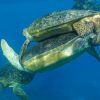 +15 +1
+15 +1'Crazy' sea turtle mating marathon underway on Great Barrier Reef
Hundreds of sea turtles are gathering off the coast of Bundaberg for a frenzied annual breeding season involving hooks, multiple partners, the threat of sharks and the odd case of mistaken identity.
-
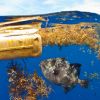 +16 +1
+16 +1The Atlantic Is Awash With Far More Plastic Than Previously Thought, Study Finds
A new study suggests there is far more plastic in the Atlantic Ocean than scientists estimated earlier, especially tiny pieces of plastic that can end up inside fish and other animals.
-
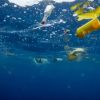 +16 +1
+16 +1Atlantic microplastic 'weighs millions of tonnes'
There are 12-21 million tonnes of tiny plastic fragments floating in the ocean, scientists say.
-
 +10 +1
+10 +167 more tons of marine debris has been removed from the Pacific
The crew of the Ocean Voyages Institute returned to land after 35 days on the water.
-
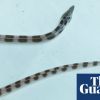 +16 +1
+16 +1Snake eels burst through the stomach of predators in bid to escape being eaten alive
Creatures’ attempts are in vain, and as they are unable to burrow through the fish’s ribcage, the eels become trapped in the gut of their captor
-
 +1 +1
+1 +1Sleeping Sounds with Ocean Sounds - Relaxing Ocean Scene and Sounds of Waves
Feel the peaceful and relaxing state with the soothing waves of the sea at sunset, clear sea waters and a calm island beach, live.
-
 +16 +1
+16 +1Saving ocean life within a human generation is 'largely achievable' say scientists
A “substantial” recovery of life in the oceans could be achieved by 2050 if major threats such as climate change are dealt with, a study has said. The oceans are important sources of food, water and clean energy and key for tackling global warming as they store heat and carbon, but many marine species, habitats and ecosystems have suffered catastrophic declines.
-
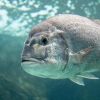 +3 +1
+3 +1Warming oceans are causing marine life to shift towards the poles
Climate change is dramatically changing the abundance of marine life around the world. As oceans warm, populations of species that can adapt to elevated local temperatures have increased nearer to the poles, while those that live closer to the equator are shrinking in size.
-
 +14 +1
+14 +1'Incredible journey': Loggerhead turtle, released from 20 years in captivity, swims 37,000km to Australia
An 180 kilogram turtled named Yoshi has excited scientists, who tracked her remarkable journey halfway around the world after she was released from 20 years in captivity.
-
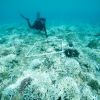 +37 +1
+37 +1Nearly All Coral Reefs Will Disappear Over The Next 20 Years, Scientists Say
Over the next 20 years, scientists estimate about 70 to 90% of all coral reefs will disappear primarily as a result of warming ocean waters, ocean acidity, and pollution. Expand that out to 2100 and it’s “looking quite grim,” says Renee Setter, a marine scientist at the University of Hawaii in Manoa. By 2100 there will be nearly zero suitable coral habitats remaining, eliminating nearly all living coral reef habitats.
-
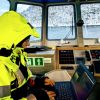 +9 +1
+9 +1Alphabet launches Tidal, a moonshot to save the world's oceans
It covers almost three quarters of the Earth, but we know only a fraction of what lies beneath the ocean’s surface. Google’s parent company Alphabet has today launched a new initiative called Tidal aimed at changing that.
-
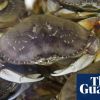 +17 +1
+17 +1Pacific Ocean’s rising acidity causes Dungeness crabs’ shells to dissolve
Acidity is making shells of crab larvae more vulnerable to predators and limiting effectiveness in supporting muscle growth
-
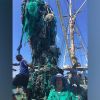 +4 +1
+4 +1A 'ghost net' in Hawaii is threatening marine life right now
Environmentalists warn that a large "ghost net" is floating in Hawaiian waters that could threaten marine life and cause severe damage to boats if not removed soon. Ghost nets are massive fishing nets that have been left or lost at sea by fisherman. Officials are asking people to be on the lookout for what they believe to be a net measuring 50 feet long by 70 feet wide, and approximately 50 feet deep in the sea, according to Matt Lane, a spokesman with the nonprofit Love the Sea.
-
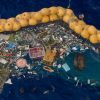 +4 +1
+4 +1A floating device created to clean up plastic from the ocean is finally doing its job, organizers say
A huge trash-collecting system designed to clean up plastic floating in the Pacific Ocean is finally picking up plastic, its inventor announced Wednesday. The Netherlands-based nonprofit the Ocean Cleanup says its latest prototype was able to capture and hold debris ranging in size from huge, abandoned fishing gear, known as "ghost nets," to tiny microplastics as small as 1 millimeter.
-
 +31 +1
+31 +1A month at sea with no technology taught me how to steal my life back from my phone
As the head of a media and communications program, my life's digital-analogue balance was off. Four weeks at sea with no devices refocussed my views – even on things that had been there all along.
-
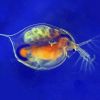 +18 +1
+18 +1Nanomaterials in wastewater have toxic effects on crustaceans and fish
You may not always think about it when you do your laundry or flush the toilet, but whatever you eat, wear or apply on your skin ends up in wastewater and eventually reaches the environment. The use of nanoparticles in consumer products like textiles, foods and personal care products is increasing. What is so special about nanoparticles is their tiny size: One nanometer is one-billionth of a meter.
Submit a link
Start a discussion




















